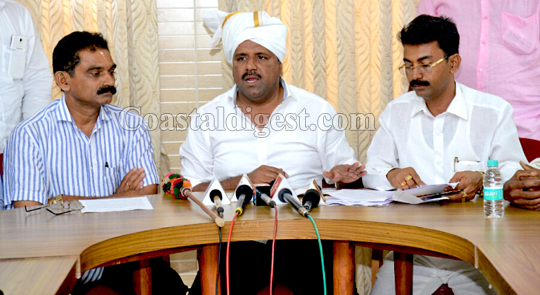Mangaluru, Jan 29: Amidst fear over spread of the mysterious Zika virus across the world, Karnataka Health and Family Welfare Minister UT Khader has discussed the issue with representatives of WHO.

“I had a discussion about Zika virus with WHO representative on Thursday. I will meet them again on Friday to understand about the screening protocols at airport since very little is known to us. We will go according to the advice given by the WHO. If screening is required, we will have experts deployed at airports to screen flyers exhibiting symptoms of Zika virus infection and help stop further spread of the deadly virus,” he told media persons in the city on Friday.
He also said the health minister instead of trying to screen people at airports - most of whom will be asymptomatic - should concentrate on eliminating breeding sites of mosquitoes especially Aedes aegypti mosquito. “Chile and Canada are at zero risk since the Aedes mosquito is not found there,” he noted.
He also pointed out that since there are reports that the first case was confirmed in South East Asia in 1966, and in the late 1970s it was documented in Pakistan, India, Malaysia and Indonesia, the virus may be dormant in Indian population. ``what is the possibility that it is not already in Indian population,'' he questioned. Regarding Zica virus causing Guillain-Barre syndrome (GBS), Dr Kakkilaya said even in Mangaluru we have GBS cases. “But we do not know whether it is related to Zica virus,” he said.
Pan American Health organisation says that an increase in GBS has been observed in areas where a Zika virus epidemic has been documented like French Polynesia and Brazil.
WHAT IS ZIKA?
The Zika virus is spread from person to person through the bite of an Aedes aegypti mosquito. The most common symptoms of Zika virus disease are fever, rash, joint pain and conjunctivitis. The incubation period for the virus is two to seven days. Like in dengue, patients develop fever, rash and joint pain but in a mild form. Doctors advice against taking aspirin and non-ster oidal anti-inflammatory drugs like ibuprofen and Naproxen. According to CDC, deaths caused by the Zika virus are rare. So far, there's been one report of possible spread of the virus through blood transfusion and one report of possible spread of the virus through sexual contact.
Experts believe it's only a matter of time before India becomes its next target The Zika virus, transmitted by the Aedes aegypti mosquito (the same vector that is known to transmit dengue and chicken guinea) has spread widely in Brazil with more than 2,500 cases reported in 2015. And according to doctors, the mosquite-borne disease should be a cause for concern in India. Healthcare workers in Brazil woke up to the crisis when pregnant women infected with Zika were discovered to have delivered babies with microcephaly, or, an abnormally small head and incomplete brain development. While medical experts were in the middle of establishing more links between the virus and the birth defect, an advisory issued by the Center for Disease Control and Prevention (CDC) last week cautioned pregnant women and those of childbearing age against travelling to Brazil and 13 other countries where cases of Zika virus have surfaced.






Comments
Everything happens with the permission of ALLAH... So ask protection from HIM alone .. U Will be saved from any type of disease unless it is decreed on U .. Just follow the cleanliness, where ever U Go .. Keep Clean-your home, city, society & help others in keeping clean to prevent such Virus... Have faith in ALLAH & never fear.
But why mundas
Add new comment